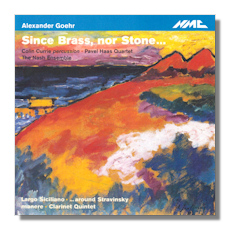
The Internet's Premier Classical Music Source
Related Links
- Goehr Reviews
- Latest Reviews
- More Reviews
-
By Composer
-
Collections
DVD & Blu-ray
Books
Concert Reviews
Articles/Interviews
Software
Audio
Search Amazon
Recommended Links
Site News
 CD Review
CD Review
Alexander Goehr

Since Brass, nor Stone
- Since Brass, nor Stone … 1,2
- … Around Stravinsky for Violin & Wind Quartet, Op. 72 3-7
- Quintet for Clarinet & Strings, Op. 79 3,5,8-10
- Manere, Op. 81 6,11
- Largo Siciliano, Op. 91 7,11,12
1 Pavel Haas Quartet
2 Colin Currie, percussion
3 David Alberman, violin
4 Gareth Hulse, oboe
5 Richard Hosford, clarinet
6 Ursula Leveaux, bassoon
7 Richard Watkins, horn
8 Laura Samuel, violin
9 Lawrence Power, viola
10 Paul Watkins, cello
11 Marianne Thorsen, violin
12 Ian Brown, piano
NMC D187
Alexander Goehr was born in 1932. He formed part of the Manchester New Music School – along with Birtwistle, Maxwell Davies and John Ogdon. He also studied with Messiaen and Yvonne Loriod in Paris. Since then, Goehr has also had a distinguished international teaching career. His style varies and may seem hard to pin down. Never subsequently (explicitly) allying himself with any particular compositional school, the composer has nevertheless worked in a broadly Serial tradition: his father, Walter, was a pupil of Schoenberg's. For years Alexander was regarded as a member of the British and European avant-garde, reflecting indeed the influence of Messiaen. Latterly his music seems to advocate purely musical traditions over the privileging of technological methods.
This excellent CD from NMC reflects this development. It presents five broadly conventional chamber pieces all written between 2002 and 2012. They are at the same time concentrated focused and directed. They are also revealing; and outward looking… … Around Stravinsky (Opus 72) for violin and wind quartet, for instance, explicitly recalls the latter's classical daintiness; Goehr's composition is only a degree or two warmer than Stravinsky's frosty, pure and demure style.
The Clarinet Quintet also sets that wind instrument in the context of the strings in the way that Mozart did but Brahms did not; it embeds it. What's more, Goehr is distinguished by his adherence to an acknowledgement of the importance of the past and the immensity of the Western (musical) tradition. In a sense, though, music like this quintet and the Largo Siciliano, Opus 91, which is the longest work on the CD and ends it, blend accepted trends and "precedents" with a freshness that's characteristic of the British approach to new music. While not attempting to "start afresh", the individual voice and personal priorities, play a role in – at the vey least – "adapting" conventions to more modern sensibilities. The Largo thus combines quoted material – from Messiaen – with an implicit commentary on the source's (Mode de Valeurs et des Intensités) immersion in the brief Total Serialism movement. Both are expertly and effectively mapped onto the particular rhythmic character of the Siciliano dance. In this and other cases, the performers on this CD, carry no self-conscious brief to emphasize musical precedents: the music they play is all Goehr's.
Manere is not dissimilar in origins and executions. It's based on the line of the Graduale Romanorum plainchant which contains "Sed: Sic eum vol Manere" (where "Manere" is "to remain"). More juxtaposition of past and permanence with present adaptation. The nine short movements reflect both the refusal of mediaeval ideas ever to overstay their welcome; and the need for contemporary playing and ideas to be brief and to the point.
Members of the iconic Nash Ensemble play as expertly and with as much conviction and spontaneity in the final four works as do Currie and the Pavel Haas Quartet in the first. Sensitivity, absorbingly understated technical prowess are as prominent as are gentleness, an unstudied grace and precision. For all its inheritance of the staccato, for example, the Largo Siciliano seems to "emerge" rather than be pushed onto us. Not, though, that there's any lack of rigor on the players' part; or that approximations are ever made by them. Of course these musicians are extremely familiar with contemporary music. Nevertheless, Goehr's idiom is, as said, a somewhat unusual one. It needs to be understood well for the experience to be effective. Everyone working on this CD has that understanding.
The acoustics of these recordings all serve to bring out both the intimacy and confidence of the writing and playing. Instruments are – appropriately – closely miked. Timbres, textures and techniques are all rendered available but not pressed on the listener. The booklet is informative, and the whole produced to NMC's usual high standards. If you're new to Goehr, this CD makes an excellent introduction. If already a collector, you'll want to include this CD: none of these works is otherwise available in the sadly all too short recorded catalog of Goehr's.
Copyright © 2013, Mark Sealey





















